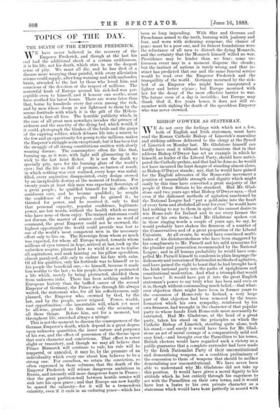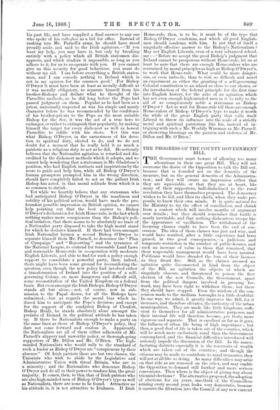BISHOP O'DWYER AS STATESMAN.
do not envy the feelings with which not a few, his past life, and have supplied a final answer to any one who spoke of his volte-face as a bid for office. Instead of rushing into Mr. Parnell's arms, he should have stood proudly aside, and said to the Irish agitators,--' If you want my help, you may have it, but only by breaking entirely with a policy which all British statesmen dis- approve, and which renders it impossible, so long as you adhere to it, for us to co-operate with you. If you cannot give us this security for good behaviour, you must do without my aid. I am before everything a British states- man, and I can concede nothing to Ireland which is not in my opinion for the common good.' For Bishop O'Dwyer it must have been at least as morally difficult as it was morally obligatory, to separate himself from his brother-Bishops and declare what he thought of the Parnellite methods, as he did long before the Pope had passed judgment on them. Popular as he had been as a priest, universally respected as was his simple and manly character before he was recommended by the confidence of his brother-priests to the Pope as the most suitable Bishop for the See, it was the act of a true hero to endanger, or rather to extinguish that popularity, by making himself the target for every dishonest as well as honest Parnellite to riddle with his shots. Yet this was what Bishop O'Dwyer, in the earnestness of his devo- tion to spiritual duty, elected to do, and we do not doubt for a moment that he really held it as much a patriotic as a religious duty to act as he did. He seriously believes that the Nationalist agitation is retarded and dis- credited by the dishonest methods which it adopts, and we cannot help wondering that a statesman in Mr. Gladstone's position, who had English instincts and inspirations by the score to guide and help him, while all Bishop O'Dwyer's human prompters prompted him in the wrong direction, should have completely failed to act as the gallant Irish Bishop has acted, in that moral solitude from which it is so common to shrink.
Yet while we heartily believe that any statesman who had anticipated Bishop O'Dwyer in the manliness and nobility of his political action, would have made the pro- foundest possible impression on British opinion, we cannot help pointing out that the best answer to Bishop O'Dwyer's declaration for Irish Home-rule, is the fact which nothing makes more conspicuous than the Bishop's poli- tical isolation, that there seems to be absolutely no trace of a Nationalist party disposed to take the high moral stand for which he declares himself. If there had been amongst Irish Nationalist laymen a second Bishop O'Dwyer to separate himself from Mr. Parnell, to denounce the "Plan of Campaign" and " Boycotting " and the tyrannies of the National League, to contend for reasonable Land Laws and reasonable Home-rule in co-operation with moderate English Liberals, and able to find for such a policy enough support to consolidate a powerful party, then, indeed, there might have been some ground for reconsidering the question, even though the new policy had involved either a transformation of Ireland into the position of a self- governing Colony, or, more dangerous and difficult still, some reconstitution of the United Kingdom on a federal basis. But even amongst the Irish Bishops, Bishop O'Dwyer stands all but alone,—not, of course, now in sub- mission to the Papal decree, for all the Bishops have submitted,—but as regards the moral bias which in- duced him to anticipate the Pope's decision; and except for the support of the coadjutor Bishop of Clonfert, Bishop Healy, he stands absolutely alone amongst the prelates of Ireland in the political attitude he has taken up. If there be Nationalists enough to make a party on the same lines as those of Bishop O'Dwyer's policy, they dare not come forward and confess it. Apparently, the Nationalists are all of them either adherents of Mr.
Parnell's slippery and unworthy policy, or thorough-going supporters of Mr. Dillon and Mr. O'Brien. The high- minded Nationalists who would rally to the standard of such a leader as Bishop O'Dwyer are "conspicuous by their absence." Of Irish patriots there are but two classes, the Unionists who wish to abide by the Legislative and Administrative Union with Great .Britain, who are in a minority ; and the Nationalists who denounce Bishop O'Dwyer and do all in their power to traduce him, the great majority. It comes, then, to this, that of Irish patriots who are also high-minded men of Bishop O'Dwyer's type as well as Nationalists, there are none to be found. Attractive as his attitude is, it is not attractive to Irishmen. If Irish Home-rule, then, is to be, it must be of the type that Bishop O'Dwyer condemns, and which all good English- men should, condemn with him. Is not that of itself a singularly effective answer to the Bishop's Nationalism ? May not English Liberals, even of a very advanced school,. say Before we accept the good Bishop's judgment that Ireland cannot be prosperous without Home-rule, let us at least be sure that there are enough Home-rulers who are restrained by moral principles as high as Bishop O'Dwyer's, to work that Home-rule. What could be more danger- ous, or even imbecile, than to risk so difficult and novel an experiment as either the granting of a self-governing Colonial constitution to an island so close to our shores, or the introduction of the federal principle for the first time into English history, for the sake of an agitation which has not even enough high-minded men in it to rally to the- aid of so conspicuously noble a statesman as Bishop. O'Dwyer ? Let us wait for Home-rule till there are enough Home-rulers of Bishop O'Dwyer's type to make it worth the while of the great English party that calls itself Liberal to throw its influence into the scale of a strictly. moral and spiritual patriotism like his, instead of in- - triguing with such a Mr. Worldly Wiseman as Mr. Parnell, or showering blessings on the passion and violence of Mr._ Dillon and Mr. O'Brien.'



































 Previous page
Previous page